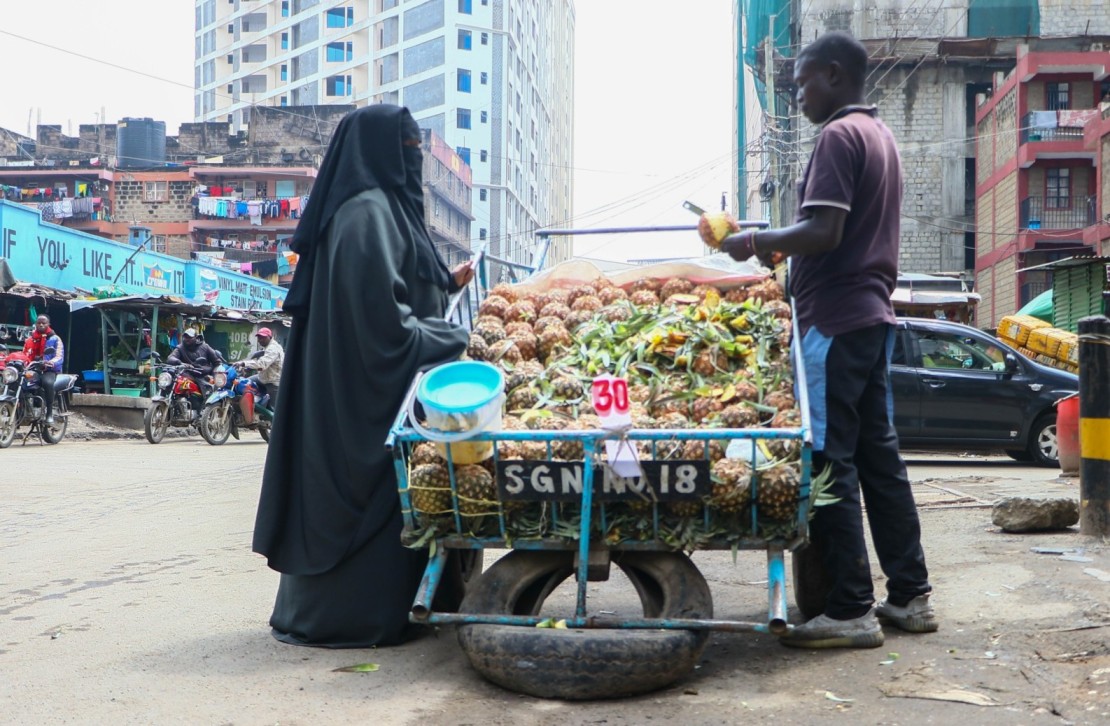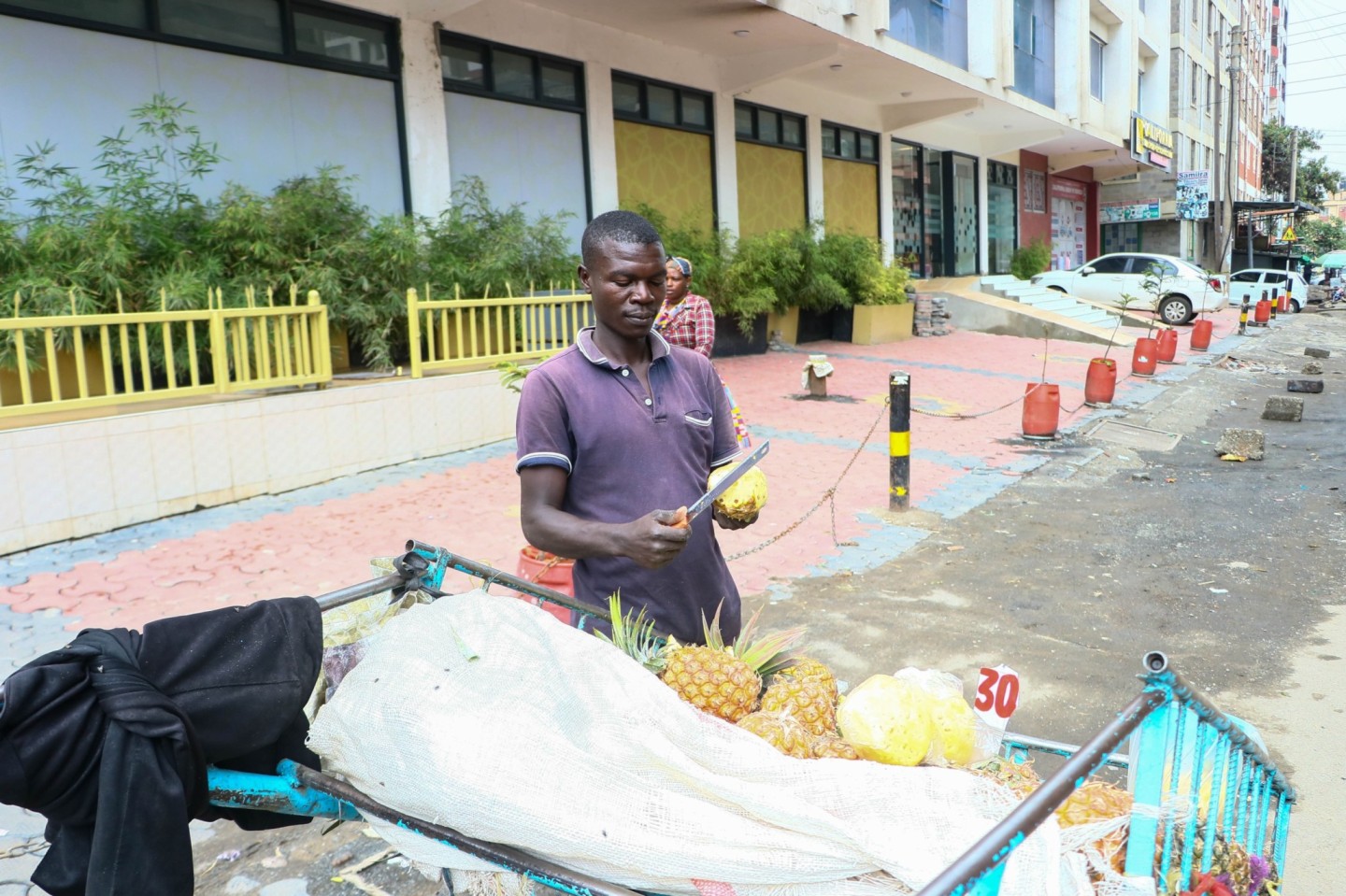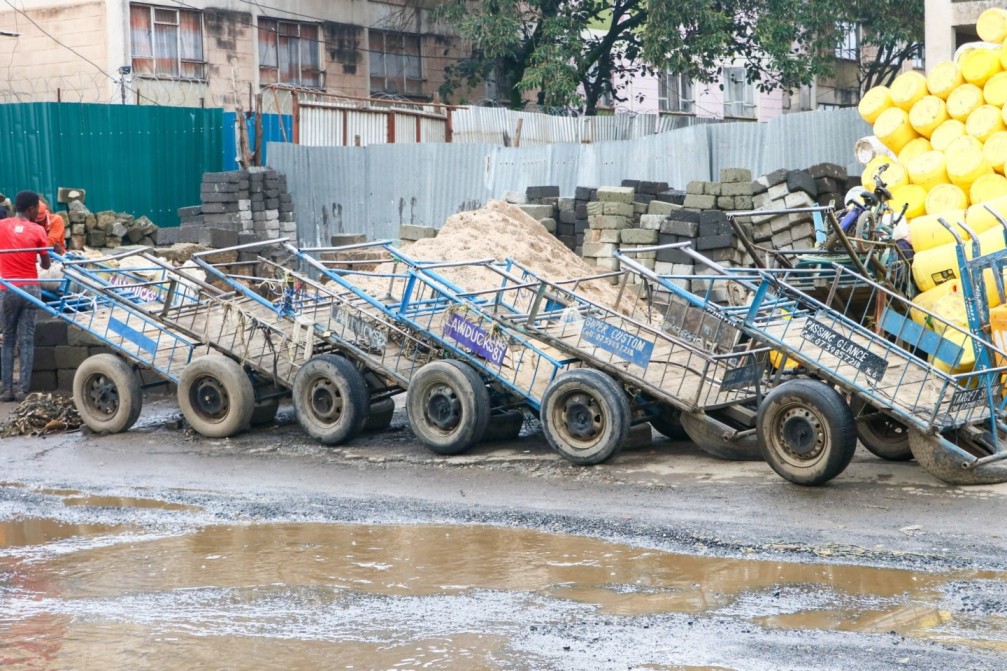Eastleigh youth discover hidden gem in mkokoteni as source of livelihood

Each cart represents a young person's determination to make ends meet, to support their families, and to build a future.
More To Read
- How community initiative is reviving Eastleigh’s cricket legacy
- Eastleigh MCA blames county officials for destruction of newly built Captain Mungai Street
- Youth football comes alive in Eastleigh as Fazam Academy clinches Moi Cup title
- Eastleigh’s 24-hour economy key to Kenya’s commerce, says CS Lee Kinyanjui
- Nairobi County, Eastleigh Business Association agree on food safety and restaurant licensing
- CBE curriculum spirit alive in Eastleigh as parents lead new wave of youth football development
For years, carts, also known as mkokoteni in Kenya, have been perceived as a strenuous way to earn a living. In Nairobi, cart pullers frequent the streets, pushing cargo from one business to another or helping commuters transport luggage within the Central Business District (CBD).
However, for the youth in Eastleigh, within the Kamukunji constituency, these carts are much more than just vehicles; they are a vital source of livelihood as they navigate the challenges of unemployment.
Each cart represents a young person's determination to make ends meet, to support their families, and to build a future.
As they grapple with high unemployment rates, these young individuals have discovered the hidden gem of hiring mkokoteni carts. This allows them to earn a living daily without worrying about storage or losing the cart.
John Maina, a resident of Huruma, starts his day early, making his way to Eastleigh to sell fruits. "When I came to Nairobi, I didn't have a job until a friend suggested selling fruits in Eastleigh. I have never looked back," Maina recalls.
For the past four years, Maina has been selling a variety of fruits in Eastleigh from his trusty cart. "Every day, I wake up at 5 am to go to Marikiti Market for the fruits, then I hire a cart in Huruma and head to Eastleigh to sell my produce," he explains. Hiring the cart for 100 shillings a day, Maina finds the arrangement convenient as it requires no guarantors, given his local residence, and he doesn't have to worry about its security.
 Rodgers Munyoki poses for a picture in front of his mkokoteni at California ward in Kamukunji, Nairobi on July 10, 2024. (Photo: Justine Ondieki)
Rodgers Munyoki poses for a picture in front of his mkokoteni at California ward in Kamukunji, Nairobi on July 10, 2024. (Photo: Justine Ondieki)Rodgers Munyoki poses for a picture in front of his mkokoteni at California ward in Kamukunji, Nairobi on July 10, 2024. (Photo: Justine Ondieki)
Maina's life has transformed significantly through his fruit business. He shares, "On a good day, I make between Sh2,000 and Sh3,000 in profit, depending on the season. I mostly sell bananas and pineapples, and sometimes mangoes, depending on the fruits in season."
Maina encourages other young men to seek opportunities, saying, "There are opportunities out there; you just need to go out and try."
Rodgers Munyoki, a 21-year-old mass communication student, discovered the hidden potential of hiring Mkokoteni carts to sell oranges in Eastleigh during his school holidays.
"Initially, we didn't know we could hire the cart, so we started by just hawking fruits and saving up. We began with one box of oranges costing Sh800 and eventually upgraded to about six boxes," Munyoki recalls, adding that they hire carts at 7th Street in Eastleigh.
"To hire a Mkokoteni, you pay Sh100 shillings plus an extra Sh50 as security. I was motivated to hire the cart because it allows you to carry more fruits and make better profits compared to just hawking," Munyoki adds.
Using a Mkokoteni, Munyoki can make about Sh4,000 on a good day, whereas hawking makes it challenging to even hit Sh2,000. "Mkokoteni has many advantages. On a good day, you can make about Sh2,000 in profit, and on a bad day, about Sh1,000. The challenge with fruits is their perishability, especially on rainy days," he shares.
According to Munyoki, if a cart is misplaced, you must buy another one, though he has never lost one. "In the mornings, we sell on the estates around California, and in the evenings, we go into the market to sell to traders," he adds.
Munyoki reflects on the significant impact his business venture has had on his life, noting that he no longer worries about essentials and survival during holidays. Through working and saving money, Munyoki has managed to support himself through school. He advises young men to find legal ways to stay busy and productive.
Brian Sitati, a resident of Eastleigh, has carved out a role for himself in assisting traders at Garisa Lodge by transporting their goods and wares to their stalls. "A friend introduced me to this job, and for about two years, I've never been in need. My daily wages come from transporting," Sitati explains.
He notes that on a good day, he can earn up to Sh1,500 from the business. "This line of work is highly competitive. To maximise earnings, one must rise early and work late. Building strong relationships with individual traders is also key to success," Sitati advises.
 Christopher Muli poses for a picture in front of his mkokoteni at California ward in Kamukunji, Nairobi during a street interview with the Eastleigh on July 10, 2024. (Photo: Justine Ondieki)
Christopher Muli poses for a picture in front of his mkokoteni at California ward in Kamukunji, Nairobi during a street interview with the Eastleigh on July 10, 2024. (Photo: Justine Ondieki)Christopher Muli poses for a picture in front of his mkokoteni at California ward in Kamukunji, Nairobi during a street interview with the Eastleigh on July 10, 2024. (Photo: Justine Ondieki)
Christopher Muli, a trader who began renting out Mkokoteni carts in California, Eastleigh, in 2014, saw an opportunity to support fellow youths. He started the business to help other young people, and he has witnessed many lives transform as they have been given new opportunities.
He mentions that he currently has about 30 carts available for hire, along with other items like wheelbarrows and jerricans that aid in various trades. "To hire from me, youths pay between Sh50 and Sh200 shillings, depending on the duration and what's needed. I only rent out to youths who know each other, as they can vouch for one another," Muli clarifies.
Reflecting on the challenges, Muli notes that he has lost approximately 20 carts since starting his business. "When someone loses a cart, we agree on a payment plan that allows them to make partial payments. I plan to expand and purchase more carts to offer more opportunities to everyone," he adds optimistically.
The youth population in the country currently stands at 19.5 million and is projected to rise by 16% to 22.7 million by 2030, according to the Kenya National Bureau of Statistics. Approximately 23 million young Africans, accounting for 4.5%, are unemployed, and this number is expected to climb to nearly 27 million by 2030.
In Kenya, the challenge of youth unemployment is significant, with the majority of the population under the age of 35. The 2019 census data revealed that youth aged 20–34 form a large portion of the urban population, highlighting the concentration of young people in cities like Nairobi.
 Several carts parked along the road in Eastleigh on July 10 2024. (Photo: Justine Ondieki)
Several carts parked along the road in Eastleigh on July 10 2024. (Photo: Justine Ondieki)Several carts parked along the road in Eastleigh on July 10 2024. (Photo: Justine Ondieki)
Top Stories Today












































